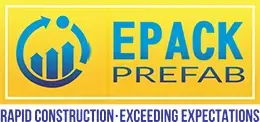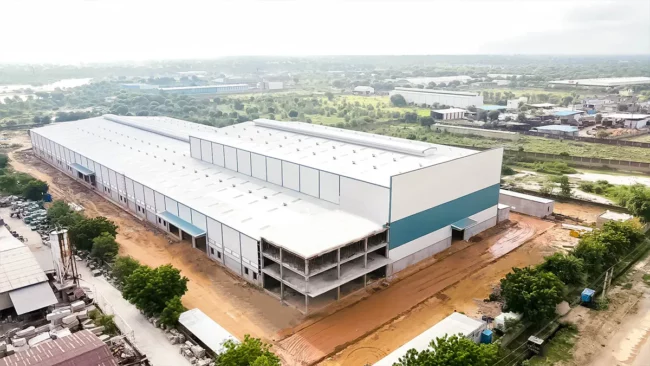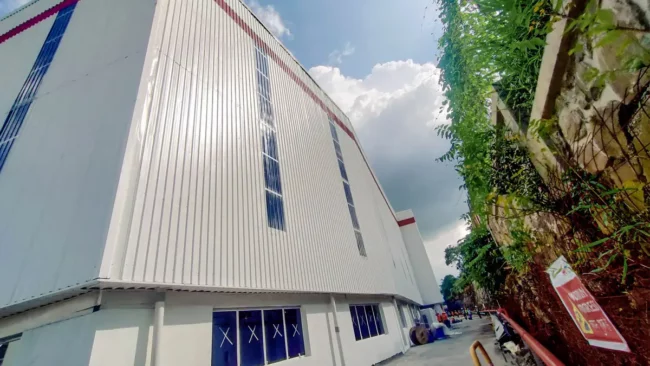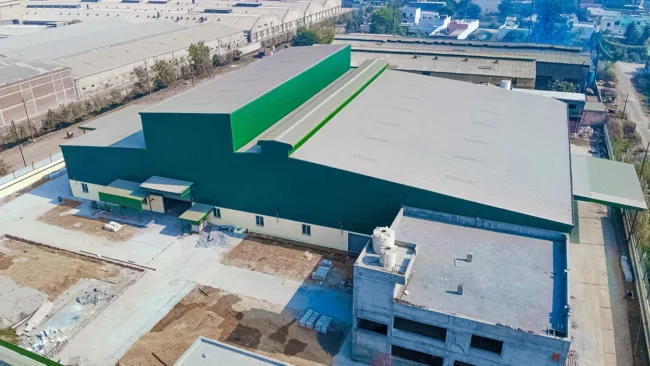EPACK Prefab provides durable and efficient prefabricated factory buildings for various industrial applications, including warehouses, production plants, and testing facilities. These solutions ensure quick installation, energy efficiency, and long-lasting performance at an optimized cost.



Prefab Factory Building Manufacturing Technology
EPACK Prefab utilizes cutting-edge technology and precision manufacturing processes to create factory buildings that meet industrial standards:
- Material Quality: High-grade steel and insulated panels for strength and insulation.
- Structural Design: Rigid columns, beams, and trusses ensure stability and accuracy.
- Flexible Construction: Offsite manufacturing minimizes on-site disruptions while enabling faster installation.

Applications of Prefabricated Factory Buildings
EPACK Prefab’s factory buildings are suitable for diverse industrial needs, including:
- Production plants and manufacturing centers
- Warehouses and logistics hubs
- Testing and quality control facilities
- Industrial enclosures
- Assembly and inspection areas
Why Choose EPACK Prefab?
EPACK Prefab stands as a reliable solution provider for prefabricated factory buildings, ensuring:
- Cost-Effective Solutions: Competitive pricing without compromising quality.
- Custom Design Options: Flexible layouts for expansion and modifications.
- Sustainable Construction: Energy-efficient materials that reduce operational costs.
- Industry Expertise: Over two decades of experience in delivering turnkey industrial solutions.
- End-to-End Support: Comprehensive services, from design and manufacturing to installation and maintenance.
Frequently Asked Questions
A factory building is a structure designed to house industrial operations such as manufacturing, assembly, storage, and related activities.
Factory buildings are typically constructed using steel, prefabricated panels, reinforced concrete, and insulated materials for durability and efficiency.
Prefabricated factory buildings offer faster construction, cost efficiency, flexibility in design, and reduced environmental impact.
Pre-engineered buildings (PEBs) use pre-designed components for faster assembly, while traditional buildings require on-site construction, which takes longer.
Yes, factory buildings can be fully customized to meet operational requirements, including dimensions, load capacity, ventilation, and insulation.
The construction time varies but is typically shorter than traditional methods, often completed within a few weeks.
Yes, they are designed for long-term use and can withstand harsh environmental conditions and heavy industrial loads.
Prefabricated factory buildings are eco-friendly due to minimal waste during construction, the use of recyclable materials, and energy-efficient designs.
The cost depends on factors like size, design, materials, and location, but prefabricated options are generally more cost-effective.
Yes, modular prefabricated factory buildings can be easily expanded or modified as business needs evolve.
Factory buildings are used across various industries, including manufacturing, food processing, textiles, pharmaceuticals, and automotive.
Insulation enhances energy efficiency, maintains temperature control, and reduces noise in factory buildings.
These buildings are equipped with features such as fire-resistant panels, ventilation systems, and structural reinforcements for safety.
Yes, EPACK Prefab offers end-to-end solutions, including design, manufacturing, transportation, and on-site installation.
Their customizable designs, quicker construction timelines, and energy-efficient features optimize workflow and reduce operational costs.
These buildings require minimal maintenance, primarily involving inspections and minor repairs to maintain structural integrity.
Yes, prefabricated factory buildings are designed to support heavy machinery and operational equipment.
Roofing options include insulated panels, metal sheets, and skylights to enhance natural lighting and energy efficiency.





